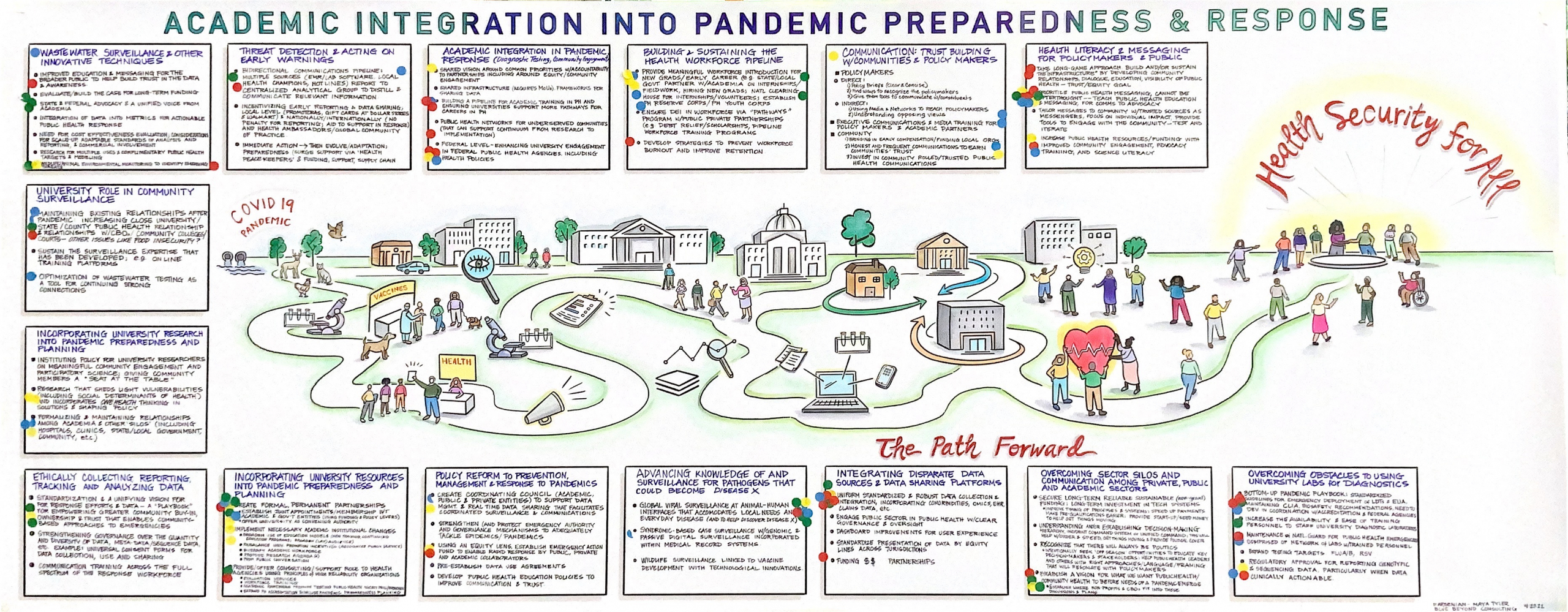Work toward improved scientific and health literacy among the public, especially increasing understanding around how information changes as situations evolve.
Bay Area Global Health Alliance, Healthy Davis Together, and UC Davis Grand Challenges laid the groundwork in building a roadmap for academic and private integration in pandemic preparedness and prevention April 26-28, 2022. Inspired by wanting to improve our collective pandemic response, this intimate gathering of private, non-profit, public, and academic sector members represented all regions of the U.S.
The two-and-a-half-day workshop brought together participants to share, learn, and connect over their COVID-19 experiences. Through a series of case-study presentations and breakout sessions, the group worked to ensure the hard lessons of this pandemic wouldn’t be for naught.
Participants brought reflections on the challenges faced, structural obstacles in need of reform and proven best practices that can be more quickly applied to help prevent and better manage the next pandemic.
Unsolved Challenges
Trust – There is public health hesitancy, as well as significant distrustfulness of government, science, and academics. Communication around public health must be improved immediately.
Transparency – There is a lack of transparency in how decisions are made, as well as how and why data are collected and used. It’s difficult to ethically collect, report, analyze, and share huge amounts of data from disparate sources.
Resources – There are not enough trained and certified personnel and supplies to staff a large-scale crisis. Worker entry, advancement, and retention are impeded by labor practices and funding limitations. Academic and government workforces need to become more diverse and representative of the communities they are designed to serve.
Responsiveness – We must overcome the obstacles to using university and private sector resources in a time of crisis. There is often no preidentified and organized process for doing so. There is also a need to sustain funding and enthusiasm for systems at a reasonable level for efficient reactivation in times of crisis. Cumbersome and time-consuming reporting systems impede recognition of novel diseases.
Collaboration – The potential for competition and/or a lack of integration across government agencies and academia may lead to conflict, as well as a lack of clear leadership.
The workshop culminated in a roadmap priority presentation gathered directly from participants’ reports by Dr. Jonna Mazet, Vice Provost of Grand Challenges. The roadmap priorities detailed the group’s takeaways, including pandemic learnings, unsolved challenges faced that still needed solutions, as well as specific recommendations.
The workshop team is now finalizing policy briefs and technical documents that were initiated during this strategic convening. These products will be widely distributed across the private, non-profit, public, and academic sectors to provide solid guidance for what can be done now and what should be activated in a crisis to ensure pandemic resilience and health security for all.
Our Destination
A shared vision for optimal public health across sectors
University and Private Sector Resources Effectively Incorporated Into Organized Response to Public Health Crises
Public Trust in Public Health
Playbooks to Activate Systems in an Emergency and Enable Community-Based Approaches
A Well-Trained, Nimble, Diverse, Workforce
Policymakers with the Information Needed for Evidence-Based Decision Making and Playbooks to Follow in Advance of Epidemics and Pandemics
Broad Access to Standardized, Robust, Integrated Data in Accessible Dashboards
Clear Communication Lines Among Agencies and Academia
Formal, Permanent Partnerships Among Government, Academia, and the Private Sector
Pandemic Learnings Included
We must put equity first.
Relationships are key. Cross-sector partnerships and transdisciplinary collaborations are particularly beneficial.
We must establish trust in relationships, as well as in institutions and systems, ahead of the next health crisis.
Community-based organizations are essential to health security and must be included in planning and response.
Online learning platforms have amazing utility and provide unprecedented adaptability in emergencies.
Specific Recommendations
Establish pandemic early warning systems, including wildlife and environmental intelligence.
Secure long-term, reliable funding and ongoing investment in pandemic technological systems. Strengthen national bioinformatic capacity.
Maintain a “National Guard” of networked organizations with trained professionals and labs for public health emergencies. Employ an incident command system for health emergencies similar to other crises.
Use an equity lens to establish emergency action funds to enable rapid response by community-based organizations in partnership with the private sector and academic collaborators.
Develop an easy reporting system with an alert feedback loop to clinicians and other frontline workers.
Incorporate genomic surveillance into clinical care and public health recommendations
Create a coordinating council to support data collection, management, and real-time information sharing.













